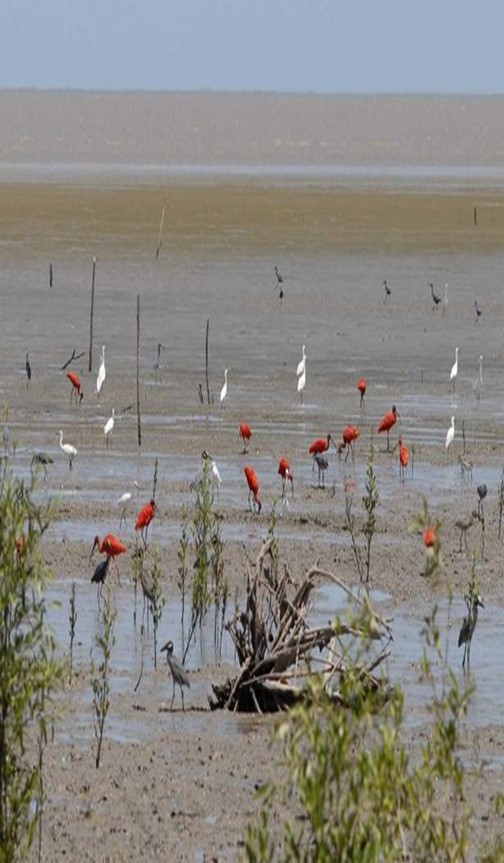Launch of Global Climate Change Alliance Suriname Adaptation Phase 2 Project

One week after the commemoration of the 75th anniversary of the United Nations, the United Nations Development Programme in Suriname hosted the official launch of the GCCA+ Climate Change Adaptation Phase 2 Project on Thursday the 29th of October. Due to the COVID 19 Pandemic, the event occurred virtually with the presence of over 50 attendees of local stakeholders, representatives of government agencies, international organizations, local NGO’s and other distinguished guests. The overall objective of the “GCCA+ Support for Climate Change Adaptation in Suriname – Phase 2 project “is to build climate change resilience in Suriname through integrated water resource management, sustainable use of mangroves and coastal ecosystems management. The project will be implemented for the duration of 3,5 years with a budget of 5,500,00 € funded by the European Union and the United Nations Development programme.
UNDP’s Deputy Resident Representative Dr. Margaret Jones Williams, mentioned in her welcome address that the project will contribute to the achievement of the Sustainable Development Goals (SDG) by Suriname, specifically SDG 13 on Climate Action, SDG 6 on Clean Water and Sanitation, SDG 15 on Life on Land, SDG 8 on Decent Work and Economic Growth and SDG 11 on Sustainable Cities and Communities.
She added that the project is also aligned with SDG 5 on Gender Equality and SDG 17 on Partnerships for the Goals. With regards to the relevance of the project; she clarified that the project supports priorities described in government policy documents, the project is aligned with the 4 pillars of the Suriname Development Plan (OP 2017-2021) specifically the pillar on sustainable use and conservation of environmental values with an emphasis on mitigation and adaptation of climate change impacts, strengthening of the national development capacity, economic growth and diversification and social inclusion. The project also contributes to the National Climate Change Policy, Strategy and Action Plan for Suriname 2014-2021, and the National REDD+ Strategy. In his Opening Address His Excellency Fernando Ponz Cantó, Ambassador Extraordinary of the European Union expressed his thanks and mentioned that climate change is the biggest threat of our times: temperatures are rising, rainfall patterns are shifting, glaciers and snow are melting, and the global sea level is rising.
He continued his speech by stressing that Climate change does not stop at borders, but that it is a global phenomenon requiring global responses. Climate Change is affecting every country on every continent. It is also disrupting national economies and affecting lives. Ambassador Ponz Canto informed the attendees that the EU is contributing significantly to the achievement of the overall target to spend at least 20 % of the EU budget for climate action for its budget 2014-2020, and intends to increase this up to an overall climate target of 30 % for the next EU budget cycle 2020-2027, according to the latest EU Commission proposal. During his speech His Excellency Riad Nurmohamed, Minister of Public Works mentioned that his Ministry is very grateful for the support which they received during the 1st Phase of the GCCA+ project from 2016- 2019. He further elaborated on the importance of climate data collection and focus of the Ministry to strengthen their Hydrologic and Meteorological capacity because the expectation is that the climate risks for Suriname will continue and even increase in the future. He added that the government is in the process of identifying and demarcating areas of high disaster risk by flooding in the coast.
The Minister concluded by stressing the need for actions towards the achievement of integrated water resource management to adapt to the impacts of climate change to ensure the availability of water for the different users and stakeholders. The Project Manager Mrs. Haidy Malone-Lepelblad gave an overview of the project objective of which one component specifically focusses on climate actions in the western coastal districts of Nickerie and Coronie. While talking about the results to be achieved, she mentioned that the project will strive to integrate climate change adaptation into the policies and plans for water governance, water management, coastal zone management and disaster risk reduction and response. She assured that special gender response actions will be developed, focusing on women and girls, who are specifically vulnerable for negative impacts of climate change and disasters. The closing remarks of His Excellency Sylvano Tjong Ahin, Minister of Spatial Planning and Environment affirmed that the impacts of climate change on our coastal communities are real and present. He stressed that his ministry is aware of the responsibility to address the need for spatial planning and environmental policy in the coast of Suriname and the importance of integrated coastal zone management policies as an adaptation measure.
The Minister’s speech was marked by the pledge that his ministry will spare no effort for the vulnerable coast of Suriname to be declared as protected area to prevent any irresponsible human intervention and thus ensuring opportunities for sustainable and creative income generation for coastal communities.

 Locations
Locations